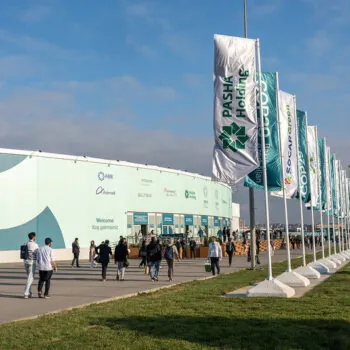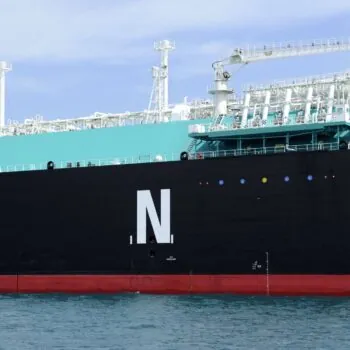Two seemingly unrelated events on the same day highlight the influence of Russia and Gazprom in the EU’s natural gas policies.
On 12 February the last 16 knock-out round of the UEFA Champions League football tournament got underway with games in Rome and Manchester, while on the same day EU officials reached an agreement on new rules for pipelines importing gas to the EU.
This agreement presented a loophole that paved the way for completing the new €9.5bn Nord Stream 2 gas pipeline from Russia to Germany.
Russian government-owned gas company Gazprom – the EU’s largest supplier – is present in both these events, showing how the two are in fact more intertwined than at first glance.
Cultural export
Gazprom began its official partnership with the Champions League in 2012, which was renewed last year until 2021. It also sponsors several professional football clubs – including FC Schalke in Germany.
The benefit to Gazprom from its Champions League partnership is clear: opinion polls commissioned by the firm showed that 51 percent of European respondents associated Gazprom’s brand with being “a reliable Russian energy supplier” because of the sponsorship, with even higher brand awareness among football supporters.
The gas supply disruptions to Europe in 2006 and 2009 by Gazprom means its reputation has not been a generally positive one.
Establishing an image as a reliable energy supplier is therefore crucial for Gazprom to maintain its current role as the EU’s largest gas supplier, at a time when the region wants to reduce its use of fossil fuels.
Gazprom’s sponsorship of the Champions League is an attempt to do this by embedding itself in the social fabric of Europe via its biggest sport and cultural export.
Supply capacity
The tournament’s final is one of the world’s most watched sporting events, with over 300 million viewers across 200 countries.
Sport’s formidable soft power is a well-used vehicle for companies and nations to showcase themselves and shape how the world views them.
And to this end, the Gazprom Football webpage weaves together upcoming fixtures and a profile of Gazprom’s charity work, with information promoting its global gas operations.
Sandwiched between a competition to win matchday tickets and Gazprom’s football TV advertisement, there is also a link to information on the contentious Nord Stream 2 gas pipeline.
The 1,440 km-long pipeline will run under the Baltic Sea to Germany, doubling the current supply capacity of this route to the EU’s largest gas consumer and Gazprom’s single biggest customer.
Political tension
While some suggest it will ensure delivery of cheaper, more secure gas, most in Europe are against the project.
Opponents argue it will increase the EU’s dependency on Russian gas, damage attempts to tackle climate change, and lock-in the use of fossil fuels.
The fact it could be used reroute some supplies away from existing pipelines in Poland and Ukraine is also regarded as a strategic play by Moscow to weaken them politically and harm their economies.
Nord Stream 2 has been particularly divisive in Germany where Chancellor Angela Merkel has backed the project, despite many – even in her government – being opposed.
Adding to this political tension, former chancellor and ex-Social Democrat party (SDP) leader Gerhard Schroeder is on the board of the consortium constructing the pipeline.
Oil
Gazprom is the majority owner, while German energy companies Wintershall and Eon are shareholders, along with French firm Engie and Dutch gas system operator Gasunie. Schroeder also sits on the board of Rosneft, Russia’s second largest gas producer.
Gazprom’s sponsorship of football club FC Schalke adds to the murk. Schroeder was reported to be an advisor to Gazprom when the sponsorship deal was announced in 2006, and he played a key role in securing it for the club.
Schalke’s home city of Gelsenkirchen is also a traditional SPD stronghold in the heart of Germany’s industrial region.
The party and some industry groups are in favour of the pipeline, and it has been suggested that Merkel’s support for it is because she relies on the SDP for her party’s parliamentary Grand Coalition.
Gas and oil account for around 40pc of Russian state revenues, and the EU will remain its biggest gas customer for some time.
But as the EU cuts its fossil fuel use and looks to reduce dependence on Russian gas, Russia’s economy will be threatened. With Germany being the EU’s biggest gas user and political force, Russia’s future depends greatly on delaying its energy transition – and that of the EU – away from gas to more renewables.
As such, Russia will reinforce its efforts to influence German politics and further weaken the EU’s approach towards Moscow, decarbonisation, and tackling climate change.


